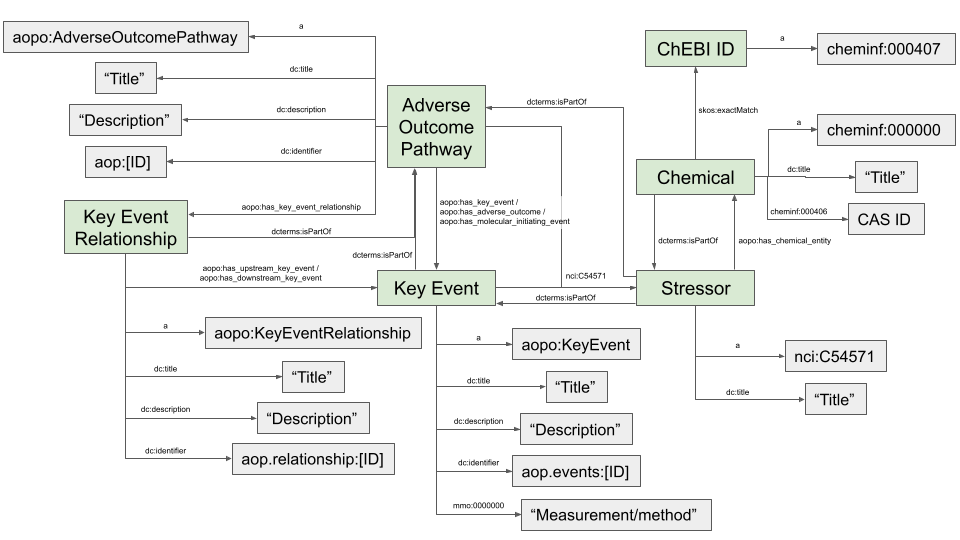PRA3006-SPARQL
AOP-Wiki
| SPARQL endpoint | https://aopwiki.rdf.bigcat-bioinformatics.org/sparql/ |
The AOP-Wiki SPARQL endpoint is loaded with RDF of the Adverse Outcome Pathway (AOP)-Wiki database (https://aopwiki.org/) [1]. The AOP-Wiki serves as the primary repository of qualitative information for AOPs and is a central component in the AOP development effort coordinated by the Organisation for Economic Co-operation and Development (OECD). These AOPs describe mechanistic information about toxicodynamic processes and can be used to develop effective risk assessment strategies. An AOP is initiated by a stressor (e.g. a chemical) that causes a Molecular Initiating Event, which is followed by Key Eevents (measurable, essential steps) along a pathway towards an Adverse Outcome for an organism or population. KEs are connected through Key Event Relationships (KERs), which capture the evidence supporting the AOP in a structured way.
The AOP-Wiki SPARQL endpoint is accessible on https://aopwiki.rdf.bigcat-bioinformatics.org
Entities
The main classes are:
- Adverse Outcome Pathway: a pathway that describes how an initiating event leads to an adverse outcome
- Gene
- Protein
Data model
The figure describing the RDF schema:

Example queries
The simplest SPARQL queries to explore RDF is to retrieve full lists of subjects of a particular type, which is
frequently defined with the predicate rdfs:type or a which can be used interchangably. See the below
example of listing all Key Events.
SPARQL sparql/keyevent.rq (run, edit)
SELECT ?KE
WHERE {
?KE a aopo:KeyEvent .
}
Since the Key Event links can bring you to the AOP-Wiki for further exploration of the corresponding webpage,
we can also directly request all their contents through the SPARQL query. For example, to extract the
Key Event title, we add ?KE dc:title ?KEtitle to the SPARQL query. The returned table upon running the
query will get wider, so you might need to scroll to the right.
SPARQL sparql/keyeventWithTitle.rq (run, edit)
SELECT ?KE ?KEtitle
WHERE {
?KE a aopo:KeyEvent .
?KE dc:title ?KEtitle .
}
Counting key events
This exercise is about creating simple SPARQL queries that count particular types of subjects in the RDF. See the example SPARQL query below that counts the number of Key Events in the RDF.
SPARQL sparql/keyeventCount.rq (run, edit)
SELECT (count (?KE) as ?nKE)
WHERE {
?KE a aopo:KeyEvent .
}
Which returns:
| nKE |
| 1371 |
References
- Martens M, Evelo CT, Willighagen EL. Providing Adverse Outcome Pathways from the AOP-Wiki in a Semantic Web Format to Increase Usability and Accessibility of the Content. Applied In Vitro Toxicology. 2022 Feb 25; doi:10.1089/AIVT.2021.0010 (Scholia)